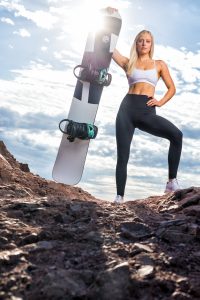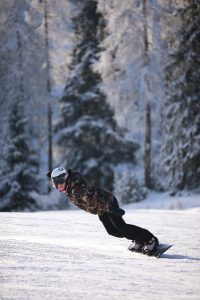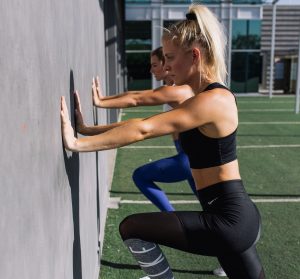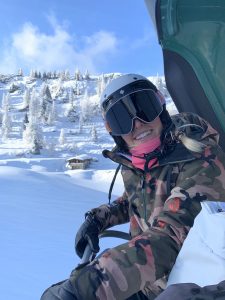When Olympic snowboarder Meghan Tierney returns to her early childhood hometown of Rumson, New Jersey, she has one thing on her mind—bagels. For the world traveling athlete, who has trouble saying exactly where home is these days, there is nothing that compares to a New Jersey bagel. Although her trips to New Jersey to visit family and enjoy some East Coast food are limited, the state remains the place where an Olympian dream was launched.
Meghan first hit the slopes with her parents and siblings who would trek to the mountains on the weekends for some family bonding, and admittedly friendly competition. With four kids, there was always someone to boast of being the fastest and someone else up for proving them wrong. Early on, Meghan skied, but as she watched her little brother take to snowboarding, she knew she had to give that a try. While her Dad taught her to snowboard, she credits her older brother with encouraging her to keep working harder and getting better at the sport. “It takes a bit of time to build confidence. My older brother convinced me to hit the bigger jumps and it scared me. But I had to push through those fears and not think too much about it. I don’t let my fears hold me back,” she said.
When it became apparent that snowboarding was a passion and seemingly natural talent for their kids, Meghan’s parents moved the family to Colorado where they could further their snowboard training. Meghan attended Vail Ski & Snowboard Academy and then the International Snowboard Training Center and along the way quickly began racking up championship accomplishments at competitions such as the FIS Junior World Championships, and World Cups. Now at age 23, Tierney has spent about 13 years on the slopes, honing her skills to become recognized as a leader in women’s snowboarding, specifically snowboard cross.
Snowboard cross was first introduced as an Olympic sport in 2006, following the sport’s debut at the X-Games. The event involves waves of competitors simultaneously racing down a slope to be the first to cross the finish line. The downhill course includes various snowboard elements such turns, drops, and berms to challenge the snowboarders’ ability to tackle changing terrain. It is Meghan’s sport of choice, although when she was younger she did more traditional courses such as half pipe, slalom and giant slalom, but the speed of snowboard cross was addicting, and she likes that it is a sport where the athletes win based on who is the quickest and not who a judge deems has the best form.
Her road to the 2018 Olympics was not assured. While she was climbing the ranks in worldwide events, she fell during training camp in Austria in 2016 and had to sit out the remainder of the 2016-17 season with a broken vertebra. Her comeback was challenging. “It was tough, mostly mentally, to come back from my injury and just to be out so long. I didn’t know if I’d even get back. I really tried to be positive. When I started back, I wasn’t anywhere near where I had been, so it made me want to work harder. I guess in some ways it (her injury) was really for the best in the end for that reason,” she said.
She did come back stronger than ever. In her first World Cup races of the 2017-18 season she placed 25th and 31st, but finished up that year at the World Cup race placing seventh which not only secured her a place on the four-woman snowboard cross team for the 2018 Winter Olympics in Pyeongchang, but also left her as the top placing American woman in the event.
For Meghan participating in the Olympics was otherworldly and made all the more special by having her whole family there to cheer her on. Meghan ended up placing 17th in her Olympic debut, but instead of dwelling on the placement, turns to overall experience. “It’s hard to describe the Olympic experience. It was awesome to have my whole family there. The opening ceremony was incredible. It was so cool. That and meeting new people and being able to watch other events. And the course was so much fun,” she said.
Meghan has been in Europe since September after COVID restrictions required she first quarantined for 10-days offshore. At this writing she was at a three-week training camp in Passo Stelvio, Italy waiting to hear if this year’s Europa and World Cups will take place or if the pandemic is going to cancel events. While she is on the mountain for two to four hours a day and in the gym five days a week, whether that hard work will be put to the test at the start of November competitions remains unknown. If she is able to compete, she will take it one race at a time. “I never put too much pressure on myself, I do the best I can and see how it goes and work on progressing. My main goal is to have no injuries this time,” she said.
If competition resumes, the world, and certainly homes in Rumson, New Jersey, will be watching to see if Meghan gets to try again for Olympic gold.
Featured image by Kate Cooper.
The post Master of the Mountain appeared first on VUE magazine.




